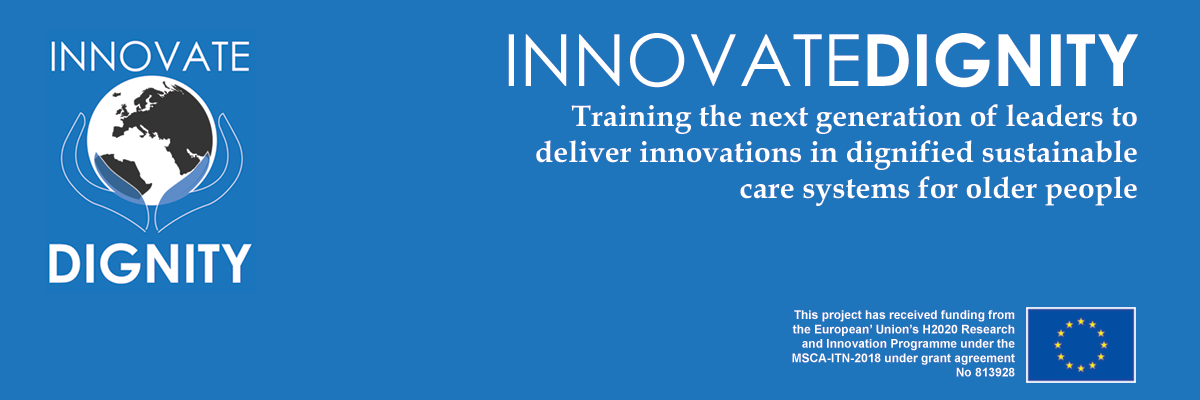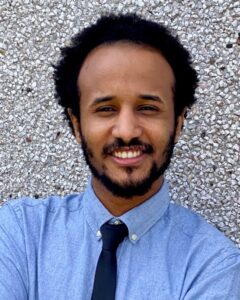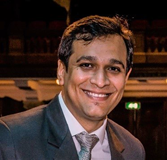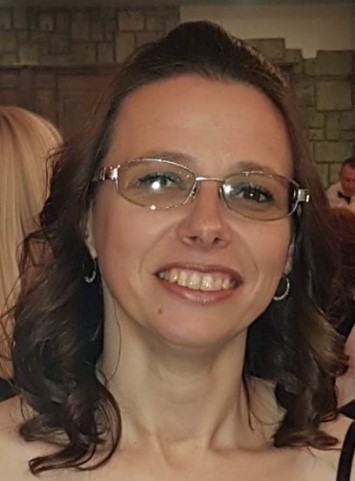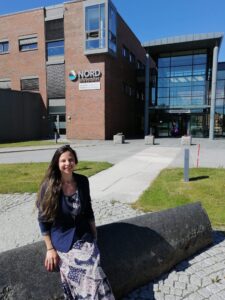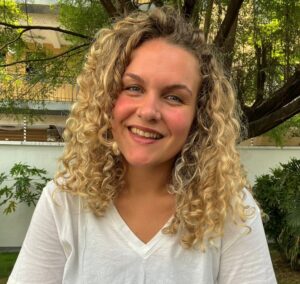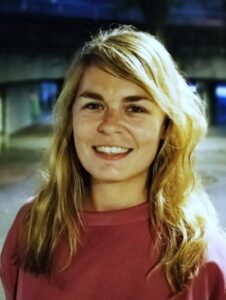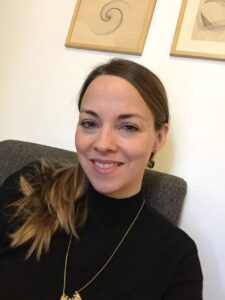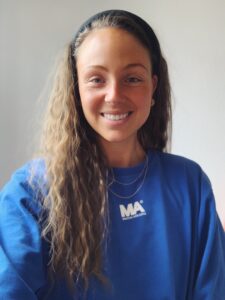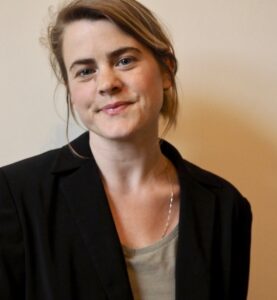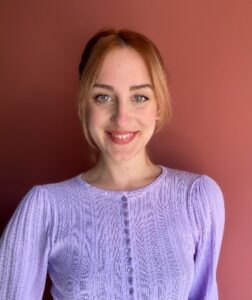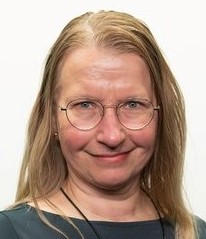ESR1: Abraham S Kebede
Project: Leading dignity in digital care development through new theoretical perspectives of dignity and its relation to wellbeing for older people.
Supervisors: Prof Kathleen Galvin, Dr Lise-Lotte Ozolins and Dr Hanna Holst
Email: a.s.kebede@brighton.ac.uk
About Abraham S Kebede
Abraham Kebede is an early-stage researcher in the INNOVATEDIGNITY project through the Marie Sklodowska-Curie Action ITN, EU Horizon 2020 at the School of Health Sciences, University of Brighton. Currently, he is working on a phenomenologically informed new theoretical and empirical framework on dignity and digital care and its relation to wellbeing for the older person. Dignity encapsulates the essence and quality of what it means to be human. He will be using a lifeworld philosophical theory evolved through the common epistemological and ontological understanding of two distinct yet intertwined continental philosophies (phenomenology and hermeneutics).
In this project, Abraham aims to investigate the everyday meanings of dignity in relation to digital technologies from older people lived through experiences. The findings from this study will inform ethical practices and policies on the specific contexts and functions of dignity and the central role of dignity for human flourishing and future digital technology development.
Abraham holds a Master of Health Science in Reproductive Health from the joint Pan African University and University of Ibadan (Nigeria) through the African Union scholarship. He previously worked as a clinician in the primary health care unit and as an assistant lecturer in the Department of Public Health in an Ethiopian higher institution. Abraham’s previous research work encompassed interdisciplinary public health areas, including maternal and reproductive health, infection diseases, evidence synthesis and meta-analysis using quantitative and qualitative methodologies.
Some of his publications are available on ResearchGate and ORCID.
ESR 2: Shuvarthi Bhattacharjee
Shuvarthi comes with an experience of nearly a decade working for Non-Profit Organizations in the health & development sector of India. He has a unique experience of transforming left wing insurgency regions in eastern region of India by improving access to healthcare facilities and transforming the lives of rural people through essential oil cultivation. Incidentally, his work on transforming lives of tribal people through essential oil cultivation was showcased as an international success story by International Fragrance Association (IFRA, Belgium). Following this, Shuvarthi was entrusted with overall responsibilities to manage healthcare facilities, comprising of one 30 bedded hospital and two small scale diagnostic centres, in the city of Kolkata in India. Over a period nearly five years, the non-profit organization was steadily transformed into a self-sustaining organization without any dependency on external funding, by offering healthcare services to the citizens of Kolkata at a nominal cost. Shuvarthi also served in multiple national and state level committees of India on universal health coverage, integrating traditional health system with modern medicine and improving environmental sustainability of forest goods.
Academically, he has a Bachelors Degree in Chemical Engineering from National Institute of Technology (India, 2010) and a Masters in Public Health with a specialization in Health Systems Policy & Management from the Royal Tropical Institute (KIT-Amsterdam, Netherlands, 2018). He received the prestigious OKP full Scholarship to pursue his masters in 2017 from NUFFIC (Netherlands). He has also completed two online weekend certificate courses on entrepreneurship supported by NUFFIC & Dutch Ministry of Foreign Affairs in 2021. Shuvarthi continues to serve on the reviewer panel for multiple journals like JMIR, JBI Evidence Synthesis, PLoS and Global Health Research & Policy.
Shuvarthi is researching on co-designing digital health technologies for older people in homecare settings. One of the crucial components of successful ageing is to live independently in old age. Yet in UK alone, nearly 300000 older people require assistance with 3 or more essential daily tasks like eating, bathing and mobility which compromises on their independent living. Additionally, in a crisis where health system in UK is already overstretched to its resources to combat the recent Coronavirus Disease 2019 (COVID-19) pandemic, allocating resources for regular homecare services has become challenging. In this situation, Digital Health Technologies (DHTs) can be a potential solution to promote healthy ageing, support psycho-social wellbeing and enhance independent living for older people. Such technologies comprise a wide range of products used in the health and care services including apps, software and online platforms to benefit people. Yet DHTs are barely adopted by older people as they do not reflect their actual user needs leading to poor appropriation of DHTs in homecare settings.
The research study aims to co-design new dignified technologies for care settings in participation with older people living in the Leach Court, Brighton which is part of the open innovation ecosystem of the Brighton & Hove Digital Health Living Lab(BHLL), an enterprise project of the University of Brighton. The research study uses a phenomenologically led participatory design approach to understand, from the lived experiences of older people , the barriers & facilitators they face in digital health technology adoption in everyday life and further, devise strategies to translate intangible human values like ‘dignity’ into tangible digital designs.
Shuvarthi is researching at the School of Sport & Health Sciences in the University of Brighton (UK) under the supported supervision of Prof. Kathleen Galvin from University of Brighton, Dr. Theo Fotis from the University of Brighton and Prof. Lisbeth Uhrenfeldt from the Nord University (Norway).
Publications:
- Bhattacharjee, S., Galvin, K., Fotis, T., & Uhrenfeldt, L. (2021). INNOVATEDIGNITY: Co-designing Digital Health Technologies With Older People in Homecare Settings. – Tabular View – ClinicalTrials.gov. Clinicaltrials.gov. Retrieved 28 June 2021, from https://clinicaltrials.gov/ct2/show/record/NCT04884711.
- Bhattacharjee, S., Yaghmaei, N., Le Phuong, C. T., & Neupane, D. (2021). Factors influencing the readiness to tackle the burden of ischaemic heart disease in India: a systematic review protocol. BMJ open, 11(8), e047464.
- Bhattacharjee, S., & Mandavgane, S. (2010). A Process for Making an Ampiphilic Mesoporous Catalyst. (Patent No. 271794). Controller General of Patents, Designs & Trademarks.
- Mandavgane, S., Tulsyan, A., JHA, B., Patil, P., Paul, S., & Bhattacharjee, S. (2010). Utilisation of recycled paper mill sludge using circulation fluidised bed boiler. In Chemical, Biological And Environmental Engineering (pp. 501-503).
Profile Information:
- ORCHID ID: https://orcid.org/0000-0002-6079-5365
- PURE Profile: https://research.brighton.ac.uk/en/persons/shuvarthi-bhattacharjee
- Researchgate: https://www.researchgate.net/profile/Shuvarthi-Bhattacharjee
- LinkedIn: https://www.linkedin.com/in/shuvarthi-bhattacharjee-36b91927
- Publons: https://publons.com/researcher/4515259/shuvarthi-bhattacharjee/
- Contact Details:
- E-mail: s.bhattacharjee@brighton.ac.uk / s.bhattacharjee2@brighton.ac.uk
ESR3 Rada Sandic Spaho
Rada started her career as a medical doctor at the oncology department for 4 years, where her workflow encompassed chemotherapy, health care of the patient with malignant diseases and their follow-up, pain management, palliative, and end-of-life care. During her work, Rada held lots of lectures for oncology patients and their families, as well as for the wider population, which led her to Master of Public health. Her love for the digital world was accomplished while she worked for 3 years as a radiologist.
Her project within INNOVATEDIGNITY, Dignity within digital innovation, embraces all the skills she has, and PhD is giving her great opportunities for self-growth, as well the opportunity to apply her project into practice and help many that are in need, influence policymakers, and other stakeholders for better care for older people, and more…
Project title: Wearable device E-health innovations and quality end-of-life care for older people
ESR3 in work package 1is:
1. Clarification of how concepts of dignified care of older people and wearable eHealth devices can be interactively developed and combined
2. Identification of contradictory perspectives in bringing these two worlds together.
3. Clarification of how digital development for end-of-life care can be combined with a theoretical framework for dignity in the care of older people.
The project will be conducted through the lens of a framework of human rights in order to enhance quality end-of-life care for older people.
Main supervisor at Faculty of Nursing and Health Science: Ingjerd Gåre Kymre, Associate professor, Faculty of Nursing and Health Science, Nord University, Norway
Co-supervisor(s): Lisbeth Uhrenfeldt, Professor, Faculty of Nursing and Health Sciences, Nord University, Norway
Dr Theo Fotis, Principal Lecturer, School of Health Sciences, Centre for Secure, Intelligent and Usable Systems, University of Brighton, UK
Objective: The project investigates how wearable eHealth solutions can improve dignified end-of-life care for older people. The work is conducted through the lens of a human rights framework for dignified end-of-life care.
Background: Different studies have investigated dignity, and dignified care for older people, separately from the use of eHealth solutions in healthcare centers, healthcare services, or their use by patients of all age groups, like eHealth for diabetes care. Digital development can improve dignified end-of-life care. This study aims to clarify the way of bringing dignified end-of-life care for older people and wearable eHealth solutions together and to bring out the comprehensive clarification of how digital development for end-of-life care can be emphasized through human rights.
Inclusion criteria and methods:
First, a scoping review is conducted based on a priory protocol. The scoping review aims to map existing evidence about older people and wearable devices in palliative and end-of-life care and identify knowledge gaps on the topic. The scoping review include primary studies, reviews, and grey literature on adults older than 65 years who use wearable devices in palliative and end-of-life care. There are no limitations about gender, type of disease, or chronic condition. Exclusion criteria are studies and reviews that have participants older than 65, who are not receiving end-of-life or palliative care, and wearables that doesn`t meet NICE Evidence Standards Framework For Digital Health Technologies inclusion criteria(NICE, 2019) .
Second, an ethnographic field study is conducted including 3-5 focus groups with healthcare providers employed at palliative health facilities. In addition, individual in-depth interviews with a sample drawn from older people (aged 65+) using any kind of wearable device, who are receiving end-of-life care, are conducted. Qualitative data analysis is based on a reflective lifeworld approach.
ESR4 Moonika Raja
Project: “Addressing the barriers to, and facilitators of, the societal digital demands in citizens 75 years and older”
Supervisors: Professor Lisbeth Uhrenfeldt (Nord University), Associate Professor Ingjerd G. Kymre (Nord University), Associate Professor Jorunn Bjerkan (Nord University), Professor Kathleen Galvin (University of Brighton)
My name is Moonika Raja. I come from Estonia and I am working with my PhD project as part of INNOVATEDIGNITY program at Nord University in Norway. I hold a Master of Speech Therapy from University of Tartu, Estonia. I have 7 years of experience working in a Department of Neurology, both with stationary and outpatient settings. I have been working with wide range of patients (with aphasia, dysarthria, stuttering and swallowing disorders), but I have been specially interested in working with older adults. I have more than 10 years of experience working with older adults in institutional and outpatient settings in Estonia and Norway. I have seen how demanding it can be for older adults to learn using new technologies provided by healthcare systems and at the same time how beneficial the results could be after starting to use a new device. As use of digital technologies is continually expanding, I believe that it is important to look into older adults` experiences in order to provide a stimulus for developing new goods and services that also would be adapted to the needs of older citizens.
You can see more in my video on our Youtube channel
Recent publications:
Raja, M., Bjerkan, J., Kymre, I.G., Galvin, K.T., & Uhrenfeldt, L. (2021). Telehealth and digital developments in society that persons 75 years and older in European countries have been part of: a scoping review. BMC Health Services Research; 21:1157. URL: https://doi.org/10.1186/s12913-021-07154-0
Raja, M., Bjerkan, J., Kymre, I.G., Galvin, K.T., & Uhrenfeldt, L. (2021). The digital development within society that persons of 75 years and older in European countries have been part of: A scoping review protocol. Journal of Nursing Education and Practice; 11(6):10-15. URL: https://doi.org/10.5430/jnep.v11n6p9
Profile information:
E-mail: moonika.raja@nord.no
Researchgate: https://www.researchgate.net/profile/Moonika-Raja
ORCHID ID: https://orcid.org/0000-0003-0711-357x
MSCA ITN Fellow | INNOVATEDIGNITY | ESR 5
Panagiota Lafiatoglou (RN, MSc)
PhD Researcher at the University of Ioannina, Greece
Supervisors: Dr Stefanos Mantzoukas, Dr Avraam Ploumis, Dr Mary Gouva, Dr Caroline Ellis-Hill
E-mail: g.lafiatoglou@uoi.gr Twitter: @giota_laf
Linkedln: https://gr.linkedin.com/in/panagiota-lafiatoglou-00bb67a4
ORCHID: https://orcid.org/0000-0002-3789-9799
Recent publication: https://onlinelibrary.wiley.com/doi/full/10.1111/jan.15016
Research topic: “Exploring the lifeworld of older individuals undergoing physical rehabilitation and their perceptions of well-being within formalised care systems in Greece”
My name is Panagiota Lafiatoglou and I am from Greece. I received my bachelor’s degree in Nursing from the University of Thessaly (former ATEI of Central Greece) in 2013, followed by my master’s degree in Healthcare Management at the Edinburgh Napier University (UK) in 2015, with a special focus on nursing leadership and clinical governance. Over the last seven years, I have worked in both clinical and non-clinical positions within various healthcare settings both in Greece and the UK. Throughout my professional career I gained practical insights into the ways healthcare provision for vulnerable populations takes place in different healthcare settings. I have especially witnessed how important is to value older individuals’ opinions and feelings about their care and integrate them in healthcare.
This ultimately led me to pursue a PhD at the University of Ioannina as a Marie Skłodowska-Curie ITN fellow. My research interests include rehabilitation nursing, older individuals’ well-being, and qualitative research methods.
In my PhD project, as part of the broader INNOVATEDIGNITY research programme, I focus on the different ways older individuals who are living with some form of Acquired Brain Injury (ABI) experience their well-being and care during their physical rehabilitation within the Greek formalised healthcare system. The study follows a phenomenological approach, which aims to explore and interpret how older individuals experience their condition, the whole process of care and finally how rehabilitation impacts on their sense of well-being. Overall, the research is expected to bring significant scientific and practical benefits, by producing new knowledge of how dignified care for older individuals can be achieved or enhanced within formalised healthcare systems.
ESR 6 Adam Nyende
University: Bournemouth University (UK) (Faculty of Health and Social Sciences)
Working title: Exploring the lived experience of control and wellbeing of older persons living with frailty within the care service provision in southern England
Supervisors:
- Dr Caroline Ellis-Hill (Bournemouth University UK)
- Dr Stefanos Mantzoukas (University of Ioannina, Greece)
- Professor Ann Hemingway
Place of secondment: Royal College of Nursing (UK)
Twitter: https://twitter.com/adamnyende
LinkedIn: https://www.linkedin.com/in/a dam-nyende-a74671a7/
The current policy discourse in many western countries points to the need for older people to remain independent and in control of their lives and care processes as long as possible. However, little is known about how people living with frailty perceive and experience control within their service use. Research in this area has been dominated by health care professionals’ views about frailty and how services should be provided. Services could be improved by learning from the first-hand experiences of older people living with frailty and what they feel increases their level of control and wellbeing within their service use. The proposition is to highlight the factors which increase their sense of control and wellbeing and how they can be built into future service development, inform care policies, and provide a new understanding for future research to develop services that are more humanising and relevant for older people living with frailty.
Adam is a Marie-Curie Early Stage Researcher at the Faculty of Health and Social Sciences, Bournemouth University (UK). A native of Uganda, he qualified as a social worker at Makerere University in Uganda and later obtained an Erasmus Mundus Joint master degree in social work from the University of Lincoln (UK), Aalborg University (Denmark), University of Lisbon (Portugal), Paris Nanterre University (France) and the University of Warsaw (Poland). He has practised social work in both the private and public sectors in Uganda. Prior to joining the Innovatedignity network, he worked with Uganda’s Ministry of Gender, Labour and Social Development where his role as a social worker revolved around making policies targeting the improvement in the welfare of vulnerable groups such as children, persons with disabilities and older people. His research interests are clustered around understanding peoples’ lived experiences to develop humanly sensitive health and social care services. Collaborations with leading care researchers on the Innovatedignity network have introduced him to philosophically derived approaches such as the lifeworld theory and the humanisation framework. He has applied these frameworks in a phenomenologically driven qualitative design to conduct a lifeworld-led research project on a sense of control and wellbeing in older people living with frailty in southern England.
ESR 8: Mette Frier Hansen
Project: Development of new ways of co-operation between hospital nurses and homecare nurses in very early discharge from hospitalization.
E-mail: m.f.hansen@ph.au.dk
About the project:
The main objectives in this project are two-fold. Firstly, the project aims to explore the experiences of collaboration between hospital- and homecare nurses and, secondly, the project aims to explore new ways of co-operation/collaborating between hospital nurses and homecare nurses in very early discharge that enhances dignified and specialized care in home care settings for older people. To gain insight on these experiences, the project will conducted focus group interviews with hospital- and homecare nurses from different regions and municipalities in Denmark. The findings of this project are important to be able to develop new knowledge and guidelines for cross-sectorial collaboration based on current experiences among nurses.
About Mette:
Mette holds a bachelor’s degree in Nursing from VIA University College in Aarhus, Denmark and she obtained her MPhil in International Community Health from the University of Oslo, Norway in June 2022. Prior to obtaining the master’s degree, Mette worked as an Oncology nurse at Rigshospitalet in Copenhagen, Denmark and she has earlier work experience as a homecare nurse in Norway.
ESR 9 Aline Dragosits
What does Aline investigate within InnovateDignity?
Aline is working on a PhD-project concerning older peoples’ (patient and relatives) perspectives on hospital- home transitions in very early discharge. The main objective of this project is to provide new knowledge about hospital-home transitions in very early discharge from older people’s perspectives and to identify new ways of supporting their ability to manage early discharge, and to contribute to sustainable and dignified care that focuses on the well-being of the older people during hospital-home transitions.
Transitions from hospital to home can be challenging for both older patients (65+) and their relatives, as older patients often leave the hospital with ongoing care needs. The continuity of care is important to avoid perpetuating unmet needs, unnecessary readmission as well as unwanted placement in residential care. In very early discharge (within 48 hours after admission) particularly, there is a lack of evidence to guide optimal communication and involvement of older patients and their relatives in terms of the hospital-home transition as well as homecare recovery.
This PhD-project will investigate the perspectives of older patients and their relatives in and after very early discharge. The objective is to identify factors in the transition between hospital and home that influence patients’ and their relatives’ well-being. A qualitative ethnographic approach divided into a theoretical, empirical, and applied part will be used. A meta-ethnography will be conducted to identify previous findings and implications for further research. In-depth interviews with older patients and relatives will gain insight into the possible challenges faced by older people in the transition process and homecare recovery.
Based on the findings of the theoretical and empirical part, application-oriented recommendations will be given to caregivers and policy makers. The findings will provide new knowledge of how patients and relatives can manage the recovery process with a special focus on well-being.
Where is Aline located and who supervises her?
Aline is located at the department of Public Health, research unit for Nursing and Health care at Aarhus University in Denmark as well as her main supervisor, professor Annelise Norlyk and co-supervisor, assistant-professor Bente Martinsen. Co-supervisor Professor Ann Hemingway is located at the Department of Medical Sciences and Public Health at Bournemouth University in England.
What did Aline do before she became an Early Stage Researcher?
Aline obtained her Bachelors and Masters within the field of health management and health promotion. Prior to moving to Aarhus, she lived in Vienna for 10 years, where she took advantage of the myriad cultural activities the city had to offer. During this time, Aline was working in the field of health service research as a health economist at the Austrian Social Insurance. With her professional experience in the Austrian health care sector and her scientific background, Aline had the opportunity to get to know health care systems from many different perspectives. She always enjoyed and enjoys working in international settings with colleagues from different backgrounds to discuss current challenges faced by health systems. She is grateful to be part of the international training network of InnovateDignity and looks forward to collaboration with the other researchers within the network and contributing to new insights on the topic of well-being in health care systems.
ESR 10 Emma Jelstrup Balkin, Aalborg University
My name is Emma Jelstrup Balkin and I’m a social and cultural anthropologist. I hold a BA in anthropology from Copenhagen University and a Masters of Research in anthropology from Macquarie University in Sydney, Australia. My previous work centered on cultural understandings of behavioural difficulties in childhood and the ways in which parental aspirations to the good life are (re)shaped by neoliberalism.
My Supervisors are:
Prof. Mette Grønkjær, Aalborg UniversityAss.
Prof. Bente Martinsen, Århus University
Dr. Mette Geil Kollerup, Aalborg UniversityAss.
Prof. Ingjerd Gåre Kymre, Nord University
For my Ph.D. in the InnovateDignity project, I shift my focus to the opposite end of the life course. My work considers the oldest old and their experiences of living in care. The oldest old are those who are over 85 years of age. As people live longer, this is a rapidly growing demographic. Sometimes referred to as the “fourth age”, it is around this time that most older people start to experience an often-rapid decline in physical and cognitive capacity. Policy and general discourse tend to emphasize values such as independence, activeness, and control as the key to successful ageing. Here in this “third age”, ageing has shed much of its previous stigma. It can be a time of leisure and self-realisation, if only you approach it with the right (youthful) attitude. However, as age advances and the oldest old become progressively more reliant on care, such ambitions are increasingly unattainable. The fourth age is widely conceptualized as a bleak and morbid fate; characterized by frailty and decline, life itself is ebbing out. In Western cultures we hold a collective fear and dread of this phase of old age. We are taught that it holds nothing of value, only decrepitude and loss of dignity.
Based on ethnographic fieldwork in nursing homes in Northern Denmark, this project will examine how the oldest old experience not only the losses of the culturally prized independence and activeness, but also what else there is in this late stage of life. What does the good life look like in its final act? How is well-being and dignity enacted and produced through relations of care? The increased need for assistance places a previously valued member of society into a category of “burden” – the very antithesis of dignity in a culture that so values independence and control. This study therefore takes its starting point in older people’s lived experiences. I am interested in the various ways in which older people make meaning of their lives in care, and in how the relations of care may help (or hinder) to create a good, dignified, final phase of life.
Anthropology approaches its subject matter with a holistic lens to consider the various ways in which it is situated in broader cultural and social contexts. The lived experiences of the individual person must therefore be seen in light of the sociocultural milieu in which their lives unfold. An ethnographic inquiry thus moves from the individual experiences to the social and political structures and back again, to provide a detailed description of the ways in which the microstructures of individual experience are shaped by the macrostructures of political and economic systems. As more and more people are living past 80 years of age, this project ultimately aims to shed light on the ways in which we can ensure that all older people experience a good and dignified life, right unto the end.
Mavis Neo Bengtsson Early Stage Researcher MSCA INNOVATEDIGNITY Project Bournemouth University , England
I am an Early-Stage Researcher (ESR) for Marie Curie in the INNOVATEDIGNITY Project, which the European Commission funds. I am doing my PhD at Bournemouth University, England. My research is under the “Living Well in the Care System” theme. The research title is: “AN EXPLORATION OF MIDDLE-AGED AND OLDER ADULTS’ PERSPECTIVES OF FUTURE HOMECARE IN THE UK AND PRINCIPLES FOR ITS DESIGN”.
My Supervisors for this project are Prof. Ann Hemingway, Dr Liz Norton and Prof. Annelise Norlyk. Our research will use a Participatory Research Approach. This project will run until Dec 2022. We will collaborate with different institutions for knowledge mobilisation, data collection, and secondments for knowledge exchange under mentorship for leadership roles through the project. You can see more in my video
I have a Bachelor of Nursing Sciences (BNSc), Diploma in Midwifery and a Master of Public Health (MPH). I have worked as a Registered Nurse Midwife for the Botswana Ministry of Health. I worked as a Clinical Trial Nurse for US Centre for Disease Control and Prevention (US-CDC) in the TB/HIV Elimination Division. In the United States President’s Emergency Plan for AIDS Relief (PEPFAR/US-CDC) Global Health Office, I worked as the Human Capacity Building Program Officer for Health Systems Strengthening and Human Resource for Health based in Botswana.
Furthermore, I worked for United Nations Development Program (UNDP) for the Africa Region Office as a Program Specialist for Health, HIV, Gender and Human Rights. Lastly, I worked for the Aligi organisation in Sweden as an Assistant Director to increase access to the Sexual Reproductive Health Rights Services for immigrant women. A project funded by the European Union and the Ministry of Health for Region Halland Sweden.
Awards
- Eagle Award: (2015) In recognition of immeasurable dedication and support as an objective reviewer for 2015 CDC global grants and cooperative agreements. (From PEPFAR-US CDC Office)
- Mission Honor Award: (2014) for flexibility, dedication and hard work while on detail to Botswana Combination Project, ensuring the project had a successful start. (From PEPFAR-US CDC Office)
- Time off Award: (2013) for excellent service and dedication for the Xpert Package Rollout Evaluation Study (XPRES), for high professional standards and far exceeding the expected numbers of enrolment at the site. (From US-CDC Office)
- Extra Mile Award: (2010) for taking part & excellent coordination in prison Study. (From US-CDC Office)
- Franklin Award: (2009, 2010, 2012) for outstanding service to persons infected with HIV and dedication to work of the IPT trial 2004-2012. (From US-CDC Office)
ESR 12 Karoline Lang
Karoline holds a Master’s Degree in Anthropology from Aarhus University in Denmark. For her Master’s Thesis she did a 6 month long field work mostly among child cancer patients and their families to understand what happens with relationships when a someone in a family get diagnosed with cancer. In general her primary interest lies within the relations that surrounds human beings and especially what happens to those human relations when illness or a possible death enters someone’s life.
Her INNOVATEDIGNITY project is also concerned with human relations. She is investigating the unique dynamic requirements of competence among registered nurses required to lead care for older people living in municipality today and in the future. The specific focus on competences is studied by exploring what is described as caring relationship between older people and the registered nurses in home care in a Danish municipality.
Project title: Investigation of the unique dynamic requirements of competence among registered nurses required to lead care for older people living in municipality today and in the future.
Main-supervisor: Associate professorLina Palmér, University of Borås, Sweden
Co-Supervisors: Senior Lecturer Kristina Nässén, Associate professor Elisabeth Lindberg, University of Borås Sweden, and Professor Fiona Cowdell, Birmingham City University, UK
Background
According to Danish statistics less older people are living in both nursing homes, care houses or in senior housings due to the fact that the Danish municipalities wish to keep the older persons in their own home for as long as possible. At the same time as the share of older persons living in care houses and senior housing has dropped, the number of older people who receive home help and home care has likewise dropped. For many years the municipalities in Denmark have justified savings in home help and home care on the basis that the need had decreased due to healthy aging and rehabilitation. But according the report Help for frail older people 2019, which VIVE (The Danish Centre for Social Science Research) has prepared in collaboration with DaneAge Association (ÆldreSagen), this is not the case.
Objectives
The overall objectives in this PhD is to try to in-deep understand what caring competences are important in nursing in order to strengthening health and wellbeing among older people instead of unwillingly doing the opposite. Caring competences described as caring relationships makes room for an interesting focus on what constitutes a relationship within caring for older people and why such is important, and further what makes a caring relationship caring. To investigate the objectives above, this PhD-project consists of four studies: 1) a systematic review about unique competencies offered by nurses, 2) two empirical studies investigating the experiences of caring relationship among registered nurses and older people, and 3) a study directed at managers and policy makers in the sector of old age in Denmark.
Methodological approach, data collection and analysis The lifeworld theory is an epistemological and methodological tool with which the world of the human being is being revealed, interpreted and understood. The overall aim of lifeworld research is to describe and illuminate the lived world in a way that expands our understanding of both human being and of human experience. Finally, a Reflective Lifeworld Approach, as a research perspective, originates exactly from the intention of allowing the actual phenomenon, here caring relationships in older people care, to guide the whole research process, by which it is eventually going to be illuminated and understood, through a journey that is characterized by openness. The data collection will contain a mixture a literature review, participant observation, lifeworld interviews, and lifeworldconversations.
ESR 13 Jayme Tauzer
– MSCA INNOVATEDIGNITY Early Stage Researcher assigned to Project 13 – “Investigation into gendered aspects of older person care with a delineation of care service and well-being impacts”
Supervisors:
Professor Fiona Cowdell, Birmingham City University, UK
Dr. Kristina Nässén, Senior Lecturer, University of Borås, Sweden
Professor Rob Smith, Birmingham City University, UK
Jayme completed her undergraduate studies in Cognitive Psychology and in Community Studies (focus on health care inequalities) at the University of California and later completed a Masters in Sociology & Social Anthropology at the Central European University. Jayme has worked as a museum archivist, a mental health counselor in a residential psychiatric facility for the elderly and most recently as a clinical researcher on a project investigating the impacts of movement and exercise on mental health in old age. Jayme has an interest in intersectionality, gender & sexuality, and embodiment. Jayme is currently a doctoral candidate at Birmingham City University’s Faculty of Health, Education and Life Sciences. She is working under supervision of Fiona Cowdell at Birmingham City University and Kristina Nässén at the University of Borås.
Jayme’s project, an “investigation into gendered aspects of older person care with delineation of care service and well-being impacts”, will illuminate the impacts of gender, a social, cultural and embodied concept often overlooked in healthcare, in order to explore the ways in which gender identity shapes residents’ experiences and perceptions of dignity and well-being in the context of a residential care facility. Specifically, this project will focus on personal relationships in order to explore the ways in which gender shapes the experiences of socialisation and intimacy among community-dwelling older adults. The data collection for this project will take place in a residential care facility located in North West England; data will take the form of both observational field notes and interview data. A theoretical framework using humanised care theory will guide open ended interviews with a purposive sample of 30 participants. The findings from this project will contribute to a growing body of humanisation of care research literature, to the development of innovative ethnographic and humanisation theory based research processes for engaging with older people to enhance dignity in care, and will offer new knowledge of gender issues that impact wellbeing in care.
ESR 14 Lamprini Maria Xiarchi
“Investigation of dynamic forces for gender balance, retention and career with policy outcomes.-From the perspective of nursing students and nurses with experiences in Greek older people care”
Lamprini has completed her BSc in Psychology at Panteion University of Social and Political Sciences, Athens, Greece, as well as her MSc in Care of Older People and of Patients with Chronic Diseases, a joint degree between the Hellenic Open University and University of Thessaly, Greece.
She began her career as a school psychologist in greek public education, having worked both in primary and secondary schools. She has also been a part of multidisciplinary teams in public hospitals and mental health institutes providing psychotherapeutic interventions, having worked with both acute psychiatric cases and psychogeriatric patients.
In her research project, Lamprini combines her educational background and work experience with her passion for a Caring Science perspective, focusing on the lived experiences of registered nurses and nursing students working in older people care, with particular attention to gender issues.
Project title: “Investigation of dynamic forces for gender balance, retention and career with policy outcomes.-From the perspective of nursing students and nurses with experiences in Greek older people care”
Main Supervisor: Elisabeth Lindberg, University of Borås
Co-supervisor: Kristina Nassén, University of Borås
Co-supervisor: Lina Palmér, University of Borås
Co-supervisor: Fiona Cowdell, Birmingham City University
Scientific advisor: Stefanos Mantzoukas, University of Ioannina
Description of the research:
Aim: The aim of this research project is to investigate the experiences and perceptions of nursing students with previous experience in older people care settings and those of professional nurses working in care facilities for the elderly in Greece, with an emphasis on gender issues and the retention of a career in this field.
Background: This study explores the caring experiences of professional nurses and potential professionals (nursing students) in the field of older people care, with an overall focus on the phenomenon of caring for older people. In addition, the present study focuses on gender issues and the ways in which they may influence the caring experience of nursing students and nurses in a health care sector where the vast majority of employed nurses are female. Finally, attention is paid to issues of maintaining a career in older people care, as there have been high rates of non-retention of a job in this field worldwide, on the side of professional nurses. The above points of interest are areas that have not been sufficiently researched in the international literature so far and compose a study that attempts to shed light on key issues affecting the quality of older people care. Doing research from the professionals’ perspective, we intend to contribute to the improvement of the quality of elderly care in the long run, both for professionals as well as recipients of care services.
Methods: In this research study we aim at the collection of subjective data, therefore, the methods of data collection and analysis are qualitative. The main method of data collection is through personal interviews with senior nursing students, as well as with nurses working in elderly care facilities. Specifically, lifeworld interviews will be conducted with senior students of the Nursing Department of the University of Ioannina, as well as with nurses working in older people care facilities, in order to gather their lived experiences in relation to the subject under investigation. Data analysis is based on a reflective lifeworld research approach.
ESR 15 Ioanna Zygouri
– MSCA INNOVATEDIGNITY Early Stage Researcher assigned to Project 15- “Impact of informal carers and gender issues for integrated care”
I have completed a BA degree in Philosophy, Pedagogy and Psychology, with a major in Psychology at the National and Kapodistrian University of Athens in Greece and a postgraduate degree, MSc in Neuropsychology at Maastricht University in the Netherlands. I have worked as a member of multidisciplinary teams providing treatment and support to children and families with mental health needs in Greece, and I also have extensive working experience as Teacher for pupils with behavioural and other neurodevelopmental and comorbid affective disorders in Oxford UK. Given my genuine interest in health care research, I am currently an MSCA INNOVATEDIGNITY Early-Stage Researcher and a doctoral candidate at the Medical School of the University of Ioannina under the supervision of Prof. Avraam Ploumis, Dr Stefanos Manztoukas, Dr Mary Gouva at the University of Ioannina and Prof. Fiona Cowdell at Birmingham City University.
Abstract My empirical study involves data collection via in-depth semi-structured interviews with primary, informal family caregivers of older individuals with physical and mental health needs in the broader area of Ioannina municipality. My study aims to explore the qualitative characteristics of family caregivers’ gendered experiences as shaped during the care of older individuals in need of rehabilitation. I will employ a phenomenological research methodology to place in a closer dialogue, phenomenology, and theoretical conceptions of gender to shape new understandings of gender evolution that are grounded on the strong familial caregiving relations. My project sought to deliver new knowledge to enhance integrated care systems with understandings of gender issues in informal care and to inform learning for mediation of negative gender impacts with a specific reference to dignity.
ESR 16: Jessica Enros
Project: Supporting older people with severe mental illness in municipal housing and home care with a focus on nature of wellbeing and health process, organizational structures, barriers and demands.
Supervisors: Professor Ulrica Hörberg, Lise-Lotte Ozolins and Hanna Holst
Email: jessica.enros@lnu.se
I am an Early Stage Researcher taking part in the INNOVATEDIGNITY project as a Research Assistant at Linnaeus University, Sweden. I am a Master of Science in Health Care with the main subject Caring Science from Åbo Akademi University in Vasa, Finland and I am also a Registered Nurse in psychiatric care and has been working for many years in outpatient settings on the Aland islands, Finland.
INNOVATEDIGNITY Research Information: The aim of this project is to develop a mutual agenda for research and education in Europe. The project strives to reach a sustainable and dignified care for older people living in municipal housing and home care. The research studies: 1) To explore the life situation for older people with severe mental illness in order to identify how health and well-being can be supported for the target group; 2) To describe how older people with severe mental illness experience their life situation and support from municipal housing and home care; and 3) To describe the support for older people with severe mental illness in municipal housing and home care from the perspective of healthcare professionals. Methods: The project has a qualitative descriptive design through interviews with open-ended questions. Data will be analyzed through a phenomenological meaning analysis according to reflective lifeworld approach (RLR) and the methodological principles of openness, flexibility and bridling. (Dahlberg et al., 2008) Data will also be generated by a scoping review and by qualitative interviews with a) older people with severe mental illness and b) healthcare professionals.
https://www.linkedin.com/in/ioanna-zygouri-57017a73/
For more information about the programme go to the Marie Sklodowska Curie (MSCA) Innovative Training Network program website
Want to know what motivates our ESRs? Read the recent interview with two of them at Boras University, Sweden:
In Swedish: https://www.hb.se/forskning/forskningsportal/projekt/innovatedignity/
In English: https://www.hb.se/en/research/research-portal/projects/innovatedignity/
